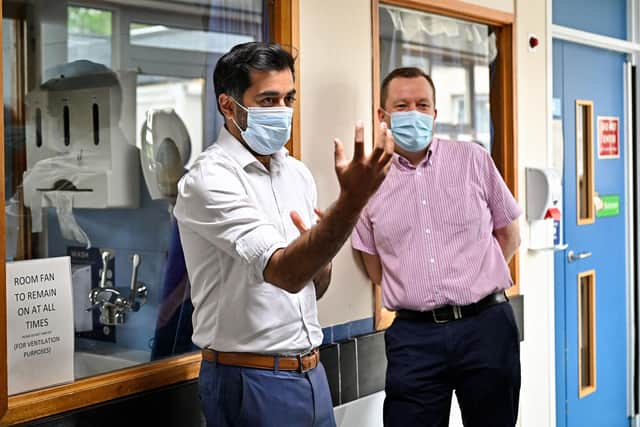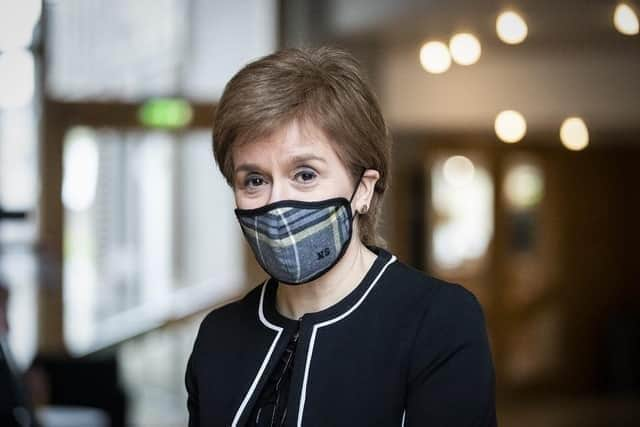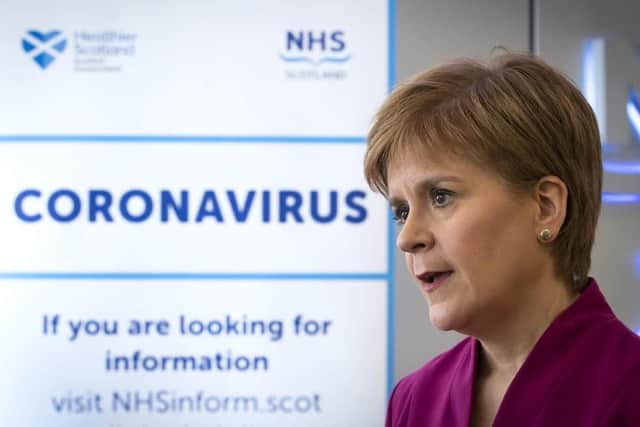WhatsApp Covid row: What did Nicola Sturgeon say? Where are Scottish Government messages?
Nicola Sturgeon is among a string of senior Scottish Government figures whose WhatsApp messages during the Covid pandemic have reportedly been deleted.
Others include Humza Yousaf, the current First Minister, and former deputy first minister John Swinney.
Advertisement
Hide AdAdvertisement
Hide AdOpposition politicians reacted with anger after it was reported that documents provided to the UK Covid inquiry showed the messages had not been retained. Jason Leitch, Scotland’s national clinical director, is also facing claims he routinely deleted messages.


All of this means, of course, the messages cannot be provided to the Scottish and UK inquiries into the Covid crisis. Similar issues have afflicted the UK Government, with Prime Minister Rishi Sunak claiming he cannot access old WhatsApps due to changing his phone several times.
But the row exploded into the headlines in Scotland on Thursday, when Jamie Dawson KC, counsel to the UK inquiry, raised concerns about the Scottish Government’s failure to hand over WhatsApps during a hearing.
So what exactly do we know, and what does it all mean?
What assurances were given?


There was an acceptance from fairly early on in the pandemic there would be a public inquiry into the decisions taken during the crisis. In May 2020, Ms Sturgeon, who was then first minister, said as much in the Scottish Parliament. The Scottish and UK inquiries were announced the following year.
In August 2021, Ms Sturgeon was asked by a journalist if she could guarantee to bereaved families that emails, WhatsApps and other messages would be disclosed to the inquiry and that nothing would be off limits. She replied: “I think if you understand statutory public inquiries, you would know that even if I wasn’t prepared to give that assurance, which for the avoidance of doubt I am, then I wouldn’t have the ability.”
For his part, Mr Yousaf told MSPs in June: “WhatsApp messages, emails, Signal messages, Telegram messages or whatever ... will absolutely be handed over to the Covid inquiries and handed over to them in full.”
Lawyer Aamer Anwar, who represents the Scottish Covid Bereaved Group, insists steps should have been taken to ensure messages were retained.


How is WhatsApp used?
Mr Yousaf has said the Scottish Government “did not routinely make decisions through WhatsApp”, but this won’t satisfy those demanding answers. Informal discussions may have taken place, which fed into decision-making.
Advertisement
Hide AdAdvertisement
Hide AdWe know for a fact that WhatsApp is used in the Scottish Government. Last year, The Scotsman revealed six ministers, including Mr Yousaf, had used WhatsApp to conduct government business.
Mr Dawson told the UK Covid inquiry there were some 137 Scottish Government message groups connected to the Covid response. “It is currently understood that although WhatsApps appear to have been used to send messages relating to and surrounding key decisions by some members of Scottish Government, the majority of the messages have not been retained by witnesses,” he said in a note to the inquiry.
So where are the messages?
The UK inquiry’s legal team believes the “majority” of WhatsApp messages shared among Scottish Government officials during the pandemic “have not been retained”. However, Mr Dawson went on to say there is a “lack of certainty” around what material is held by the Government and its officials, where it is held, and what can be recovered. More information is being sought about the circumstances in which messages were not retained.
In a filing on Thursday, the Scottish Government’s legal team asked for the inquiry to serve a section 21 notice, which would compel it to hand over messages. It said it was “mindful” of data protection rules, and this would allow it to release any WhatsApps.
It also clarified the Government’s process for informal messages, saying: “Relevant information from any such exchanges would be recorded (for example, in meeting notes or in email exchanges) and then saved in the Scottish Government’s electronic records and document management system. This necessarily requires an exercise of individual judgement as to what should be retained as part of the document management system. These principles applied before and during the pandemic, and continue to apply.”
Again, this reliance on “individual judgement” is unlikely to satisfy critics.
Asked about Ms Sturgeon’s reported deletion of messages, and whether she used an auto-delete function on WhatsApp, a spokeswoman would only say the former first minister “will continue to provide all information requested by the inquiry that she holds”.
Meanwhile, the Scottish Government has denied Prof Leitch deleted every WhatsApp message every day, but not that his messages have been wiped.
Advertisement
Hide AdAdvertisement
Hide AdJeane Freeman, the former health secretary, has provided messages, albeit these are said to be incomplete.
The Scottish inquiry issued a "do not destroy" order in August last year in a bid to preserve evidence, but this doesn’t cover anything deleted before that date.
What are the unanswered questions?
There are lots of unanswered questions, to put it mildly. Were messages deliberately deleted? If so, why? Or were they lost when, for example, a minister or official changed phone?
Why were no steps taken to retain messages, given it was accepted public inquiries would take place?
Were ministers and officials using the auto-delete function on WhatsApp? If so, was this used routinely? Was any informal advice given in relation to this? Is it still used?
In light of this row, does the Scottish Government believe its existing policy in relation to WhatsApp and other messaging services is fit for purpose?
Shona Robison, the Deputy First Minister, is to make a statement in the Scottish Parliament in the coming days, so perhaps we will get some answers then. Unless her officials send Ms Robison the speech on WhatsApp, of course, in which case it may very well get deleted.
Comments
Want to join the conversation? Please or to comment on this article.
